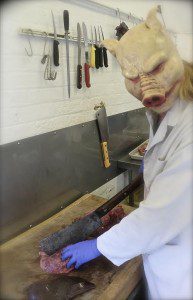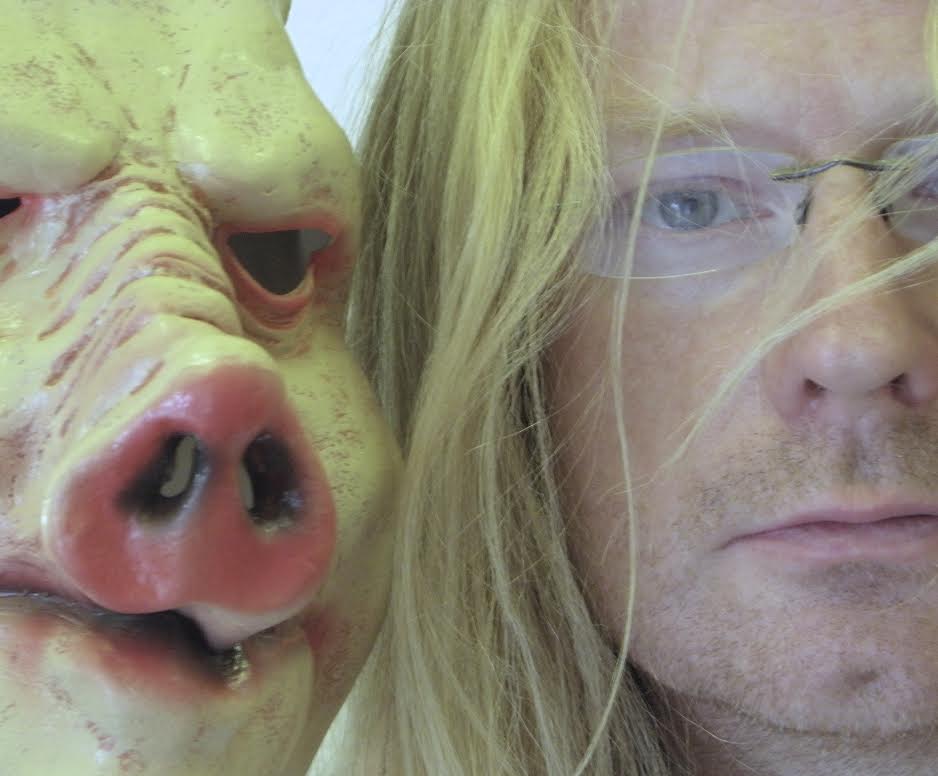Joseph D’Lacey is best known for his shocking eco-horror novel MEAT. The book has been widely translated and prompted Stephen King to say “Joseph D’Lacey rocks!”. He is also the author of the This Is Horror chapbook, Roadkill. This Is Horror sat down with Joseph to talk about the rerelease of cult classic, MEAT.
Tell us a little bit about the rollercoaster journey you’ve been on with MEAT. It was your first published novel, picked up praise from Stephen King, won a BFS award but then went out of print when your former publisher went under, only to be picked up and reprinted now, five years later.
It’s been wonderful and it’s been hell.
I remember the sense of achievement and near-disbelief at the start of it all in 2007. The first time I read from MEAT was at Latitude that summer and it went down a storm. I’ve been blown away by the response ever since.
Of course, publishing can be a fickle business and the subsequent demise of Beautiful Books stopped my career in its tracks. My ‘resurrection’, and that of my novels, is largely down to my agent, Brie Burkeman, whose influence has wrought positive changes in every aspect of my work. I don’t know how I ever got by without her.
MEAT is both a cult and controversial novel. Given the subject matter you must have anticipated the controversy but did you envisage its cult status?
To be honest, I wasn’t aware the book had achieved cult status but I’m delighted to know that’s how it’s perceived these days.
My main concern in 2008 was not how readers might take it but how the meat industry might respond if the book was successful. At launch events and signings, I always made sure my chair wasn’t backed against a wall and that there was an exit nearby. The idea that some burly, ruddy-faced man might offer a cleaver instead of the title page of the novel was never far from my mind.
Speaking of controversy what negative and misunderstood reactions have you received?
Thankfully, any unfavourable responses have been infrequent and minor. However, people have accused me of writing a vegan manifesto. I’ve been called ‘preachy’ and, from time to time, a reader will rubbish the book for personal reasons. In general, though, any negative reactions are similar to those any author has to deal with. The most amusing misunderstandings have arisen when readers reach the end of the novel, still uncertain about the true identity of the Chosen…
This is a personal story that exposes some of the real-life flaws of factory farming and the mistreatment of animals, how did you ensure these accounts were authentic?
Well, just to be clear, everything in the book is a fictionalisation of authentic and real practices. To make that shift possible, however, I did spend many unhappy, nauseated hours watching footage of factory-farming, animal transportation and slaughterhouse methods. Much of it was hidden camera work but some was the industry outlining ‘best practices’.
Either way, once you understand the huge demand for meat – entirely led by every kind of marketing and publicity you care to name – you don’t need much imagination to skew those procedures and turn meat production into something even more sinister than it already is.
 How did you ensure that MEAT didn’t come across as too preachy? Was this even a concern? It must have been difficult striking a balance between telling an entertaining horror story and putting forward an important political and social message.
How did you ensure that MEAT didn’t come across as too preachy? Was this even a concern? It must have been difficult striking a balance between telling an entertaining horror story and putting forward an important political and social message.
It was something I thought about a lot, which is unusual when I’m writing a first draft.
Before I started MEAT I was still a carnivore, albeit an occasional one. As the research and the novel itself progressed, I realised something would have to give in my own life if I was to treat the subject with any real gravity.
At the same time, the purpose of the storyteller – to tell a story and make it a good one – had to remain a priority. And I never intended to put forward ‘an important political and social’ message; I’m not comfortable in evangelical territory.
All I can tell you is that fiction allows me to explore subjects. I learn how I feel about them through the act of writing. But I won’t ever set out to moralise in a book. To do so would be to risk the objective – enthralling the reader – and that’s a gamble I’m neither willing, nor skilful enough, to take.
Let’s talk about the rerelease of both MEAT and Garbage Man, how did this come about? Were you actively seeking a new publishing house or did Oak Tree Press approach you?
I wasn’t but, unbeknownst to me, my agent was – God bless her!
Andrews UK are well known for their work in erotica and with self-published authors. Thus far, they’ve used eBooks and POD as their mode of delivery.
However, Oak Tree Press, which is their latest imprint, is a brand new venture. They’re working in a more traditional way with physical print runs and a sales team to assist in competing for space in bookstores. Their 50% royalty split makes them a very attractive alternative to the larger houses and I won’t be surprised to see agents and authors approaching them in gathering numbers.
Did you consider self-publishing the novels and if so what pros and cons do you see to taking this route?
Quite apart from MEAT and Garbage Man, I’ve thought about self-publishing ever since I started out.
I wrote a novel a year for six years and throughout that time the traditional publishing door did nothing but slam in my face, whether I had an agent or was representing myself. I wanted to publish my books myself every single time. I looked into it then and did so again when Beautiful Books went under. But I never took the plunge. It’s a gut feeling more than anything else, and it just never felt right.
I know there are authors who’ve self-published using eBook platforms and who’ve wiped the floor with the competition. I know there are a few authors out there who make an acceptable living from publishing and selling their own work. But they’re in the minority – which is why they’re in the news. If it happened every day, you wouldn’t hear about it.
I don’t have time to write, edit, proof, commission or create jacket art, typeset, package, market and publicise my work. I know some writers do and, for them, self-pubbing is the way forward.
For the moment, though, you can lump me in with the dinosaurs.
MICHAEL WILSON
If you enjoyed our interview with Joseph D’Lacey and want to read more of Joseph’s fiction, please consider clicking through to our Amazon Affiliate links and purchasing a new book today. If you do you’ll help keep the This Is Horror ship afloat with some very welcome remuneration.
Buy Joseph D’Lacey fiction (UK)
Buy Joseph D’Lacey fiction (US)










